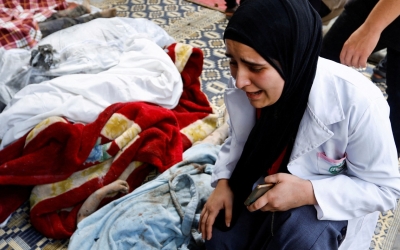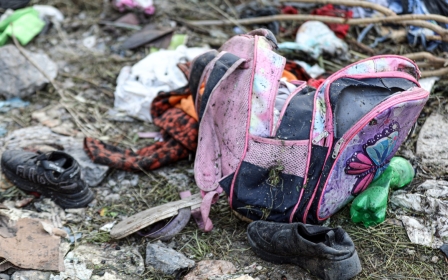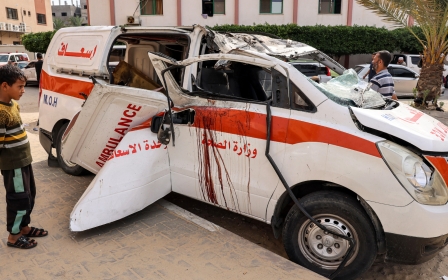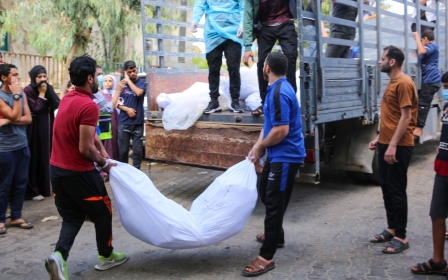Israel-Palestine war: What it's like to be pregnant in Gaza

Tears stream down Haneen Mousa's face as she considers her current reality, which, for the past 12 days, has felt like a nightmare that she cannot wake up from.
She's three months pregnant, caring for two daughters, aged two and three, and has been forced out of her home in Jabalia, in the northern Gaza Strip, under the threat of a major Israeli ground invasion into the besieged enclave.
But Mousa has also been gripped with fear about the impact that the war, and the accompanying stress and constant panic, has had on her pregnancy thus far will lead her to miscarry.
She has been experiencing bleeding episodes and is in urgent need of a medical examination. However, Israel's unrelenting and violent bombing campaign on Gaza has made access to doctors and medical services nearly impossible for the majority of pregnant women in Gaza.
"My emotional well-being has been profoundly affected. I'm overwhelmed by fear for my daughters and the unborn child in my womb. The tears seem uncontainable," she told Middle East Eye.
New MEE newsletter: Jerusalem Dispatch
Sign up to get the latest insights and analysis on Israel-Palestine, alongside Turkey Unpacked and other MEE newsletters
Mousa escaped Jabalia as the situation became increasingly "horrifying", as hundreds of thousands of people fled northern Gaza to the south following Israel's warnings for residents to either leave or face its air strikes.
The 28-year-old mother has sought refuge at her parent's residence in al-Maghazi refugee camp, in the heart of the Gaza Strip.
"The journey from my home to al-Maghazi was a harrowing experience. Children cried out in fear, men and women were in a state of panic, and it seemed as though they were disoriented, not knowing where to seek refuge," she said.
"Pregnancy hormones already substantially impact a mother's emotional well-being, but the ongoing war has intensified my distress."
Follow Middle East Eye's live coverage for the latest on the Israel-Palestine war
Access to the internet has been severely restricted, making it difficult for people to stay up to date with the situation on the ground. It was through a radio broadcast that Mousa found out that the clinic she used to visit for prenatal check-ups had been bombed.
Meanwhile, her attempts to contact an obstetrician and gynecologist have failed, as communication in Gaza has been severely disrupted after Israel's military struck the enclave's main telecom companies.
Haneen said the most harrowing moment she had so far endured during the war was the bombing of their neighbour's house.
'My most profound fear is the possibility of losing my unborn child'
- Shaima, Palestinian woman
"Thick black smoke engulfed our home, and the windows shattered. I couldn't see my daughters, but I could hear their terrified screams," she said, her voice shaking.
"We were forced to seek refuge in another neighbour's house far from ours.
"That particular night was the most intense experience of the war. More than 60 distressed women and children huddled together in the residence, which barely measured 150 square metres in size."
Now at her parents' home in al-Maghazi camp, Mousa still doesn't feel secure, as bombs continue to fall around them.
"To this day, I remain unaware of the gender of my unborn child, but I have decided to name the baby 'Salam,' which means peace in English, regardless of whether it is a boy or a girl," she said.
Trauma
Adnan Radi, a doctor at al-Awda hospital, told MEE that around 50,000 pregnant women in the Gaza Strip have been unable to access prenatal care since the war started on 7 October.
"This has especially compounded the challenges faced by women with high-risk pregnancies," he said.
A total of 33 hospitals and clinics and 23 ambulances have been put out of service by Israeli air strikes, according to the Palestinian health and interior ministries. Additionally, 22 hospitals have received Israeli warnings to leave or risk being bombed.
"Since the start of the Israeli aggression on the Gaza Strip, I haven't left al-Awda hospital. Regrettably, only fewer than 10 pregnant women have managed to reach the hospital in the last 12 days," Radi said.
"Under normal circumstances, we would provide daily care to around 100 pregnant women."
Radi said many women have had to give birth in unsafe environments, including streets or cars, as the bombardment has made it virtually impossible for women to reach clinics or hospitals.
"Some women have lost their unborn babies, and others have experienced serious complications, including uterine or cervical ruptures, internal bleeding, and placental abruption," he added.
Israel has put Gaza under siege, cutting power and fuel, and obstructing the entry of medical supplies, effectively pushing the entire health care system towards the brink of collapse.
"We are confronted with a genuine tragedy. More than half of the casualties are innocent children and women, and the aftermath promises even more horrifying consequences," Radi said.
"The psychological trauma experienced by women will require decades to heal. Their ordeals are beyond comprehension."
'Constant state of anxiety'
Shaima, 26, is six months pregnant and has completely lost her appetite. The intense stress has taken a big toll on her, leading her to vomit after every meal.
The mother of a three-year-old daughter is "deeply terrified" of the bombings and the sight of black smoke arising from missile strikes outside her window.
"I'm in a constant state of anxiety," Shaima said, "My most profound fear is the possibility of losing my unborn child."
Since the war started, she has experienced unexplained bleeding, the gravity of which is unclear as she too is scared to leave her house in search of a doctor.
Shaima longs for the return to her peaceful daily routine of waking up and preparing breakfast for her daughter and playing with her.
Instead, she now worries that Jehan barely sleeps through the night, constantly waking up crying.
"I'm making an effort to remain resilient and composed, not only for the well-being of the baby I'm carrying, but also to shield my daughter, Jehan, from fear."
Middle East Eye delivers independent and unrivalled coverage and analysis of the Middle East, North Africa and beyond. To learn more about republishing this content and the associated fees, please fill out this form. More about MEE can be found here.





